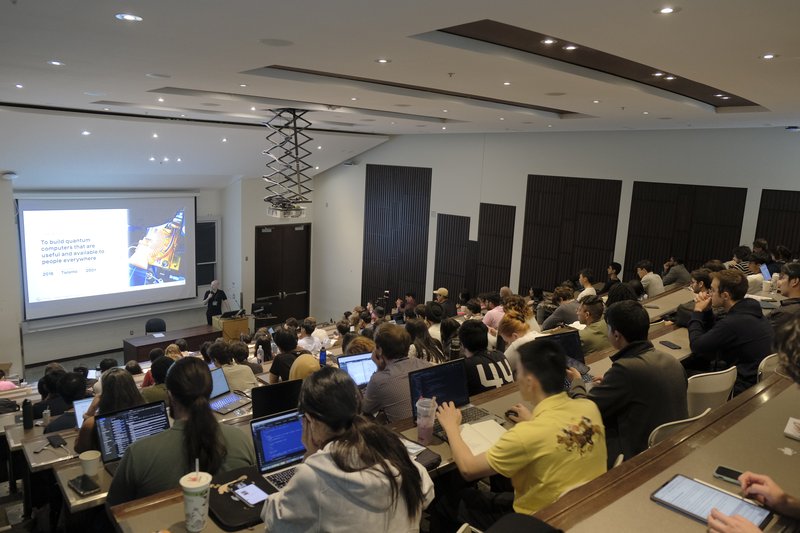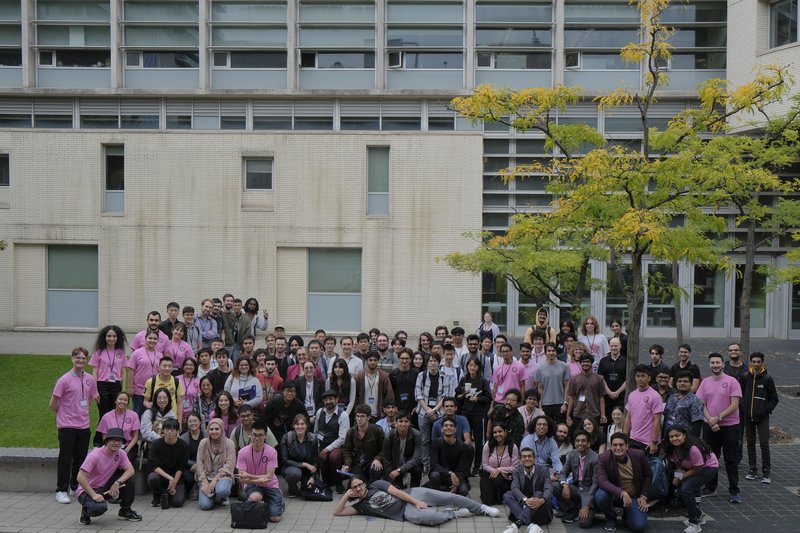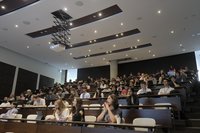From September 27 to September 29, the 2024 Q-SITE Conference took place at the University of Toronto, St. George Campus. Co-chaired by U of T Undergraduate students, Shaswata Chowdhury (Physics & CS), Vivek Dhande (EngSci), and Mojtaba (Moji) Khavaninzadeh (Physics), this conference, created “by students and for students”, aims to expose attendees to the vast and multifaceted world of quantum information science, beyond just quantum computing. One of the main goals of this event has been to provide a space in which participants interested in quantum technologies will find information, allowing them to make informed decisions about their future career paths.
This year's Q-SITE conference was the third since its inception in 2022. Moji, a pioneer of the initiative, emphasizes the need for broad exposure to various quantum fields. He notes that while hackathons have been a popular method for engaging students by allowing them to run simple quantum algorithms, they are limited in scope: “We need to have something bigger than a hackathon to expose people to [quantum technologies and sciences].” Thus, the Q-SITE Conference aimed to provide a more comprehensive understanding of the field by inviting researchers to discuss cutting-edge topics in quantum simulation, quantum sensing, quantum materials, and quantum metrology, among others. This year’s conference featured a hackathon, but it also included lab tours, industry workshops and panels, poster sessions, technical talks, and keynotes. The conference was conceived to contribute to the development of quantum talent: “If you are trying to increase the talent pool in Canada or in any other country, students need to know that such research pathways are an option,” said Moji. This is why Q-SITE recognizes that quantum information science comprises numerous subfields, each with its own research avenues and applications. By bringing in experts from institutions such as the University of Waterloo, University of British Columbia, and Université de Montréal, the conference provided attendees with a glimpse into the diverse research being conducted in Canada and beyond.

One of the unique aspects of the conference was its dual-location format. Vivek explains that this arrangement allows for a “golden hour” session in which “Toronto and Vancouver both host Q-SITE at the same time, exactly on the same days, and we stream Toronto talks to Vancouver, or Vancouver talks to Toronto.” This collaborative effort between the Quantum Clubs of the University of Toronto and the University of British Columbia ensures that quantum expertise is made accessible to participants across Canada. Vivek, who has been involved with the conference since its inception, also highlights the extensive support the event has garnered from twenty-one key industry players and research institutions. This backing not only validates the significance of the conference but also underscores the growing interest and investment in quantum information science. At the University of Toronto, “the Centre for Quantum Information and Quantum Control (CQIQC) has been a great supporter. I want to specifically thank Anna Dyring and Dvira Segal” Vivek mentioned. “It is one thing for students to do something, and another thing to see [institutional] support.” Besides CQIQC being a Platinum sponsor, “Anna has always been open to any e-mail we send her. CQIQC also invited us to the CQIQC-IX conference two years ago. It was great for the planning committee to have that exposure to the field.”
The success of the Q-SITE conference was not immediate, it took time and dedicated effort from the organizers. For instance, the foundation of the networks that now sustain the Q-SITE Conference, was laid through persistent outreach and trust-building efforts: “It really takes time to develop the connections and the networks. It is really easy to get on the call the first time and see everyone passionate about quantum computing. But organizing things is difficult. It is a day and night thing,” explained Moji, who in his role as National Chair this year, supported both the Toronto and Vancouver teams. The early stages of organizing the Q-SITE conference series began with talks in November 2021 with the UBC Quantum Club and, over time, the Q-SITE team expanded to include over 50 members from various universities, each contributing their expertise to different sub-teams, such as design, program development, and partnerships. When asked about the key for the growing success of these collaborations and of the conference, Vivek underscores the importance of shared enthusiasm for promoting quantum education: “The passion we all share for promoting this field is the secret. You need to be interested in this field to plan events and lead a club. This shared passion brings us together to make such wonderful events happen.”

The networking efforts of the Q-SITE Conference do not end with the three days of intense activities. It is a year-long commitment that includes initiatives to enhance communication among quantum clubs. One of the most recent initiatives is the creation of a dedicated Discord server. This online community now includes presidents from quantum clubs at universities such as McMaster, Western, Toronto Metropolitan, British Columbia, and even institutions in the United States. This platform facilitates the exchange of ideas and resources, fostering a supportive network that continues to expand.
Looking ahead, Vivek and Moji express optimism that future organizers will benefit from the strong foundation they and their peers have built. The established contacts, partnerships, and resources will enable the next generation of student leaders to focus on innovation and further expansion, rather than starting from scratch. This will ensure that the Conference remains a source of connection and serves as a resource for local students of each participant city. The main goal of Q-SITE organizers is that this space will continue to provide opportunities to come together and explore various aspects of the field of Quantum Information Sciences in a student-friendly environment which will allow students to learn about their local and global quantum ecosystems and discover how they can become active participants.

